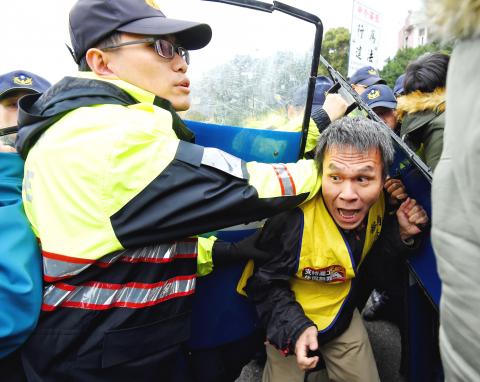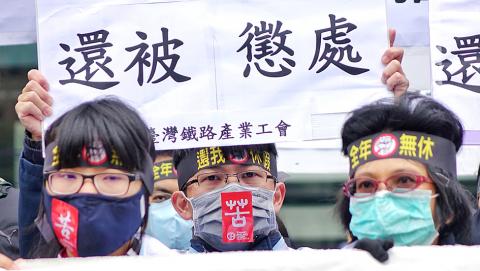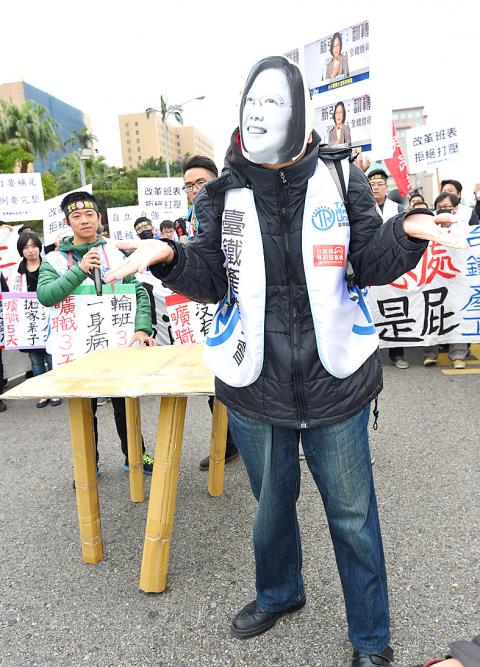The Executive Yuan yesterday announced that it approved the recruitment of 300 more employees for the Taiwan Railways Administration (TRA) to ease the agency’s personnel shortage, after more than 100 administration workers rallied in Taipei demanding reduced work hours and that the TRA drop demerits against employees who took off the Lunar New Year holiday.
Premier Lin Chuan (林全) approved a Ministry of Transportation and Communications request to hire more employees for the understaffed railway sector, with the TRA to recruit about 300 more people in addition to the 115 new employees hired since the administration of President Tsai Ing-wen (蔡英文) took office in May last year, Executive Yuan spokesman Hsu Kuo-yung (徐國勇) said.
“Compared with the previous administration, we are absolutely confident in the staffing effort,” he said.

Photo: Liu Hsin-de, Taipei Times
TRA employees are considered both workers and civil servants, as they receive civil servant insurance coverage and are included in the civil servant retirement system, Hsu said, in response to accusations the government has been treating TRA and China Airlines Ltd (中華航空) workers differently.
China Airlines employees — who in June last year won improved working conditions after a strike — are considered workers, as the airline is mostly privately owned, while the TRA is 100 percent state-owned and its employees are public servants, he said.
“Different occupational status definitions lead to different [government reactions],” Hsu said, referring to the government’s relative intolerance of protesting TRA workers.

Photo: Liu Hsin-de, Taipei Times
Minister of Labor Lin Mei-chu (林美珠) said she would negotiate with the ministry to protect the rights of striking workers, as the MOTC was poised to discipline protesting TRA workers.
Minister of Transportation and Communications Hochen Tan (賀陳旦) said the ministry has submitted a plan to the Cabinet to increase the number of TRA employees by 3,000 in the next three to five years.
“We are willing to communicate with union members regarding the personnel shortage and three-shift system issues, and are open to different approaches to resolving these problems,” Hochen said. “However, they must follow procedure and apply for leaves of absence.”

Photo: Liu Hsin-de, Taipei Times
Regarding 370 administration workers who were notified they would receive demerits for taking time off over the Lunar New Year holiday, Hochen promised to be more flexible in his handling of some of the cases, specifically of workers who had submitted applications for leaves of absence prior to the holiday and had yet to obtain approval, but said those who did not submit applications for leave would still be punished.
The TRA had previously said it would give one demerit to workers who were absent without leave for one to three days and two demerits for those who were absent throughout the entire four-day holiday. Under the administration’s rules, two demerits are sufficient grounds for dismissal.
It is inevitable that TRA workers will have to work overtime in response to service demands during peak hours, he said, adding that no agency allocates resources based solely on peak-hour requirements.
“The TRA three years ago indicated that it was short 1,200 staff, but the Cabinet approved the hiring of only 111 people. Last year, 135 new employees were hired,” Hochen said. “Some have said the agency has not been proactive enough in recruiting, but it needs to follow recruitment procedures and requires time to train new workers.”
The TRA requires an additional 1,500 personnel following the implementation of a five-day workweek, he added.
“[The problem] is not that the government avoided addressing or talking about the personnel shortage issue. [The problem] is that we are in a transitional stage, in which workers might be required to work overtime sometimes,” he said.
The Cabinet has also agreed to reform the system used to determine TRA workers’ salaries, he added.
Hochen said that the TRA is not the nation’s only agency that asks workers to alternate between day and night shifts, adding that the agency’s workers still have time to rest after working a night shift.
The problem has been that, even though the night shift lasts from 8pm to 8am, workers only received compensation for four hours of overtime, he said.
The ministry will review overtime policy and examine whether the scheme complies with the new regulations, he said.
Earlier, outside the ministry’s headquarters in Taipei, Taiwan Railway Union members chanted: “Reform the shift schedule. Reject suppression,” as they crumpled up demerit notification slips and threw them in the compound, while others pasted a copy of the Labor Standards Act (勞基法), which they said entitled them to days off during the holiday.
From the ministry, the workers marched to the Presidential Office Building and occupied the intersection of Ketagalan Boulevard and Gongyuan Road throughout the afternoon, demanding that a representative be sent to accept their petitions.
“We did not go on strike and we were not absent without leave, because national holidays are automatically considered time off under the law and working on those days is considered overtime. All we did was refuse to work overtime,” union director Wang Chun-hsiang (王俊翔) said.
“It is understandable that the extra passenger volume would require workers to not take time off, but they should at least have been afforded the option of receiving compensatory time off, which is not the case,” lawyer Tsai Ching-hsu (蔡晴羽) said.
While TRA employees are considered both bona fide workers and civil servants under the labor law, government officials have a legal obligation to choose the standard most beneficial to personnel when deciding which rules to apply, union officials said.
“The law says that we are both workers and civil servants, but the TRA has chosen only to apply sections of the Civil Service Act (公務員服務法) that benefit it,” union director Kuan Yung-ming (官永銘) said.
The union leaders dismissed the Cabinet’s promises to hire an additional 300 workers and Hochen’s pledge to be “lenient.”
“We do not understand why they want to force us to apply to take time off. The union notified them about our plans last month, which gave them sufficient time to mobilize additional resources,” Wang said, adding that 300 workers would be insufficient to close the TRA’s personnel gap.

A Ministry of Foreign Affairs official yesterday said that a delegation that visited China for an APEC meeting did not receive any kind of treatment that downgraded Taiwan’s sovereignty. Department of International Organizations Director-General Jonathan Sun (孫儉元) said that he and a group of ministry officials visited Shenzhen, China, to attend the APEC Informal Senior Officials’ Meeting last month. The trip went “smoothly and safely” for all Taiwanese delegates, as the Chinese side arranged the trip in accordance with long-standing practices, Sun said at the ministry’s weekly briefing. The Taiwanese group did not encounter any political suppression, he said. Sun made the remarks when

The Taiwanese passport ranked 33rd in a global listing of passports by convenience this month, rising three places from last month’s ranking, but matching its position in January last year. The Henley Passport Index, an international ranking of passports by the number of designations its holder can travel to without a visa, showed that the Taiwan passport enables holders to travel to 139 countries and territories without a visa. Singapore’s passport was ranked the most powerful with visa-free access to 192 destinations out of 227, according to the index published on Tuesday by UK-based migration investment consultancy firm Henley and Partners. Japan’s and

BROAD AGREEMENT: The two are nearing a trade deal to reduce Taiwan’s tariff to 15% and a commitment for TSMC to build five more fabs, a ‘New York Times’ report said Taiwan and the US have reached a broad consensus on a trade deal, the Executive Yuan’s Office of Trade Negotiations said yesterday, after a report said that Washington is set to reduce Taiwan’s tariff rate to 15 percent. The New York Times on Monday reported that the two nations are nearing a trade deal to reduce Taiwan’s tariff rate to 15 percent and commit Taiwan Semiconductor Manufacturing Co (TSMC, 台積電) to building at least five more facilities in the US. “The agreement, which has been under negotiation for months, is being legally scrubbed and could be announced this month,” the paper said,

MIXED SOURCING: While Taiwan is expanding domestic production, it also sources munitions overseas, as some, like M855 rounds, are cheaper than locally made ones Taiwan and the US plan to jointly produce 155mm artillery shells, as the munition is in high demand due to the Ukraine-Russia war and should be useful in Taiwan’s self-defense, Armaments Bureau Director-General Lieutenant General Lin Wen-hsiang (林文祥) told lawmakers in Taipei yesterday. Lin was responding to questions about Taiwan’s partnership with allies in producing munitions at a meeting of the legislature’s Foreign Affairs and National Defense Committee. Given the intense demand for 155mm artillery shells in Ukraine’s defense against the Russian invasion, and in light of Taiwan’s own defensive needs, Taipei and Washington plan to jointly produce 155mm shells, said Lin,